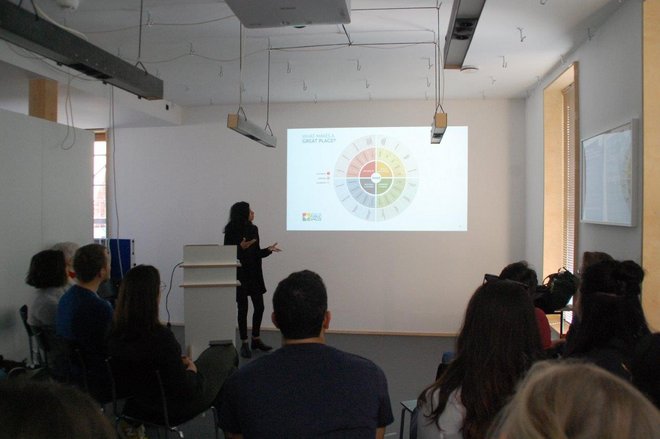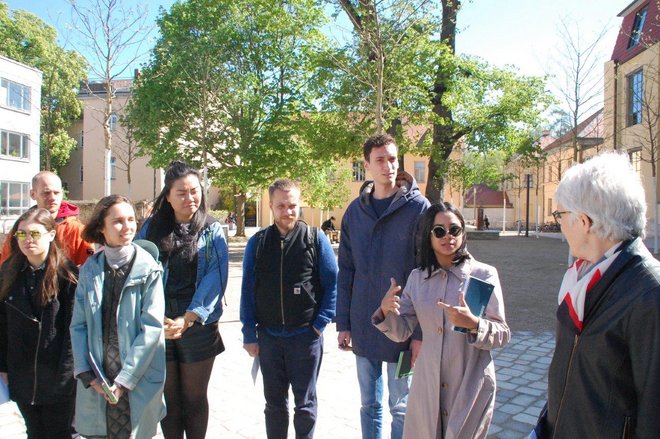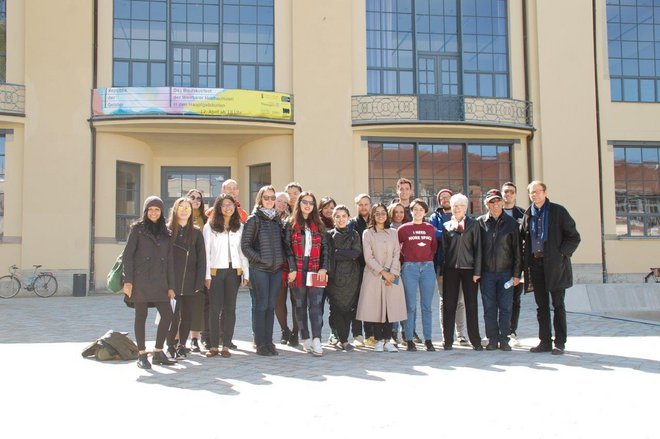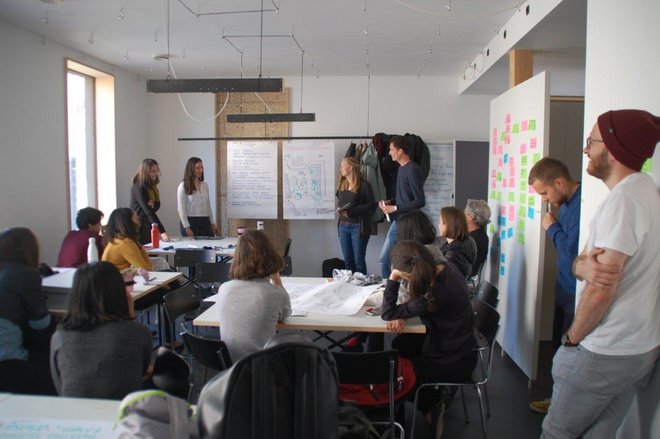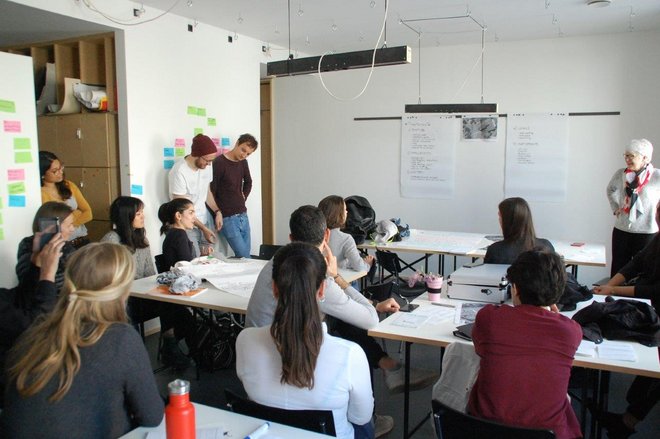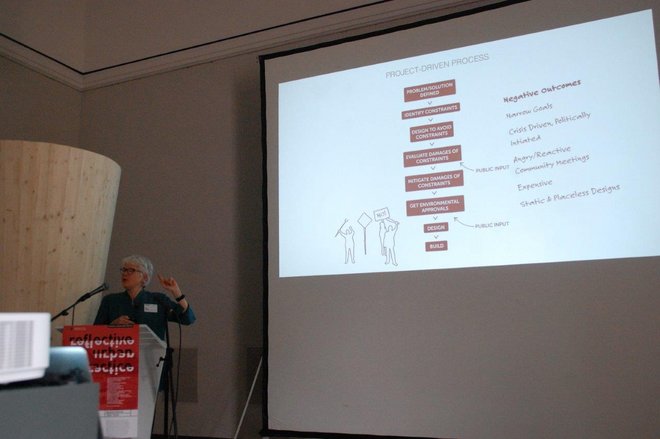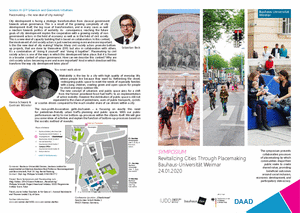Meg Walker (New York, USA), DAAD-Gastdozentur „Placemaking“
an der Bauhaus-Universität Weimar im WiSe 2019/20
Freitag, 24.01.2020 | 09:00 - 16:00 | Oberlichtsaal SYMPOSIUM Revitalizing Cities Through Placemaking
Download Programm.
Die Teilnahme ist kostenlos und erfordert vor der Veranstaltung keine Registrierung.
The symposium is free of charge and requires no pre-registration
| Time | Programme |
|---|---|
| 09:00 - 09:30 | Arrival, Check-in and Coffee |
| 09:30 - 09:45 | Welcome and Opening |
| 09:45 - 10:45 | Session I: Placemaking for Social Change |
| 10:45 - 11:00 | Coffee Break |
| 11:00 - 12:00 | Placemaking at Zschochernplatz in Gera |
| 12:00 - 13:30 | Lunch Break |
| 13:30 - 14:30 | Session II: Reviving Neigbourhoods through Retail & Commercial Districts |
| 14:30 - 14:45 | Coffee Break |
| 14:45 - 15:45 | Session III: DIY Urbanism and Grassroots Initiatives |
| 15:45 - 16:00 | Wrap-up of the Symposium by Meg Walker |
| Followed by a "Bauhaus-Walk" & Vernissage: Opening of Bauhaus.Pop-Up Space, Markstraße 16, www.uni-weimar.de/bauhauspopupspace |
Monday, 13.01.2020 | 17:00 | Audimax
IUDD Lecture "The evolution of placemaking - from reaction to regeneration",
Meg Walker, PPS
Visiting Prof. Meg Walker
Project for Public Spaces PPS New York & Pratt Institute, Brooklyn
Placemaking, as a human-centered approach to public space planning and urban design, arose in the second half of the 20th century as a strong reaction to top-down decision making by architects and engineers, and to the major disruptions caused by the automobile and urban renewal. All over the world cities were dying; they were losing their significance in the lives of people. It was Jane Jacobs, Holly Whyte, Project for Public Space and others like them who fought to take architects and technocrats off their pedestals as city builders and replace them with ordinary people. In the future, placemaking offers us the potential to no longer just react, but to be regenerative: to create truly inclusive, equitable, and resilient cities based on transformative new ideas. Cities made by everyone, for everyone.
Zum Wintersemester 2019/20 hat Meg Walker von Project for Public Spaces (PPS), New York City, im Studienprogramm Integrated Urban Development and Design (IUDD) an der Bauhaus-Universität Weimar die DAAD-Gastdozentur „Placemaking“ inne. Ihre Erfahrungen als Adjunct Professor des Pratt Institute Brooklyn (New York, USA) bringt sie nun in Weimar in mehreren Lehveranstaltungen zu Strategien der Gestaltung des öffentlichen Raums ein. Gefördert wird die Dozentur vom Bundesministerium für Bildung und Forschung (BMBF) über den Deutschen Akademischen Austauschdienst (DAAD).
Neben dem „Future of Places Lab“, welches ab 1. Oktober 2019 im Rahmen des IUDD-Studiums als methodisches Real-Labor in Kooperation mit einer deutschen Kommune zur Requalifizierung von öffentlichem Raum durchgeführt wird, findet zur Theorie ein Placemaking-Seminar sowie ein Symposium zum Thema statt.
Bereits am 30. April 2019 fand mit den derzeitigen Studierenden des Masterstudiengangs IUDD als Vorspiel zum XIX. Modellprojekte Forum ein Placemaking-Workshop mit Meg Walker und ihrer Kollegin Priti Patel von Project for Public Spaces statt.
Wir freuen uns, in diesem Zusammenhang die Methoden und Kompetenzen im IUDD-Programm zu räumlichen Analysen und Strategien im Umgang mit zukunftsweisenden städtischen Räumen auszubauen und mit den neuen Studierenden unseres Programms spannende und wegweisende Konzepte zur Requalifizierung von öffentlichem Raum zu erarbeiten!
Kommunen, die sowohl am Lab als auch am Symposium mitwirken möchten, melden sich bitte bei: Dipl.-Ing. (FH) Philippe Schmidt M. Sc., Wissenschaftlicher Mitarbeiter und Fachstudienberater IUDD an der Fakultät Architektur und Urbanistik. Telefon: +49 (0) 36 43/58 27 72, E-Mail: philippe.schmidt[at]uni-weimar.de
Abbildungen unten:
Placemaking Workshop mit Meg Walker und Priti Patel von Project for Public Spaces (PPS) und Pratt Institute Brooklyn (USA) mit Studierenden des IUDD-Programms im green:house, 30. April 2019
